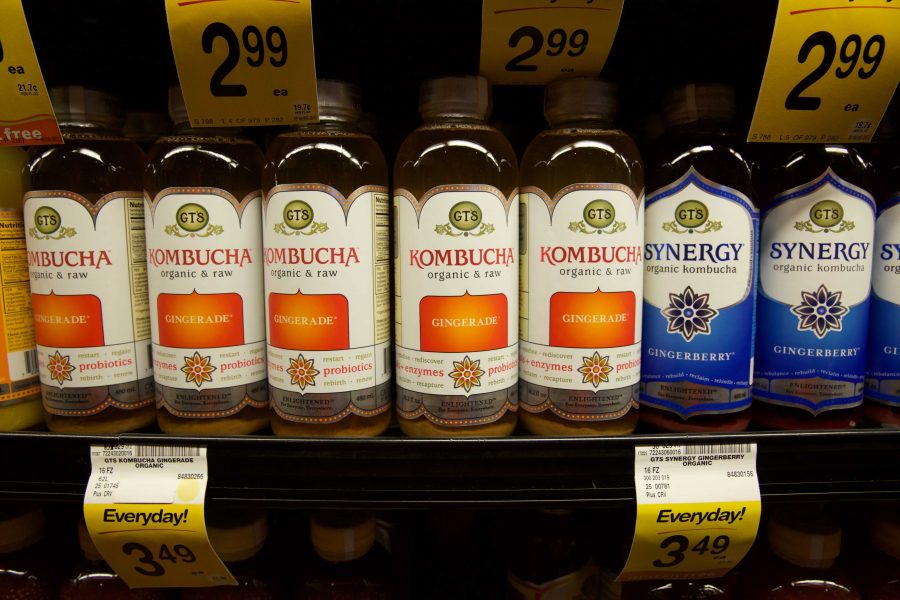Kombucha, a fizzy, acidic, fermented probiotic beverage, is a Marin favorite. The drink aisle at Whole Foods is stacked with different kombucha brands, ready to be picked up and bought by Tam students, parents, and Marin citizens of all ages. If you aren’t up on this trend, it’s time to get educated. Is it just another elitist health fad, or are there genuine benefits to consuming this drink?
There are many different theories as to the origins of kombucha. It is generally believed that it was first made in 221 BC China, during the Tsin Dynasty. It was mainly known as the “The Tea of Immortality,” but was also called “sea treasure” or “stomach treasure.” There are legends of the Samurai carrying it in their wine skins for energy, and Genghis Khan allegedly giving it to his armies before battle. Kombucha has been around for hundreds of years in Russia, Eastern Europe, and Japan, but it was almost forgotten during World War II when sugar and tea were hard to come by. It wasn’t popular in the U.S. until the late 1900s. Now, in 2017, the kombucha trend is back in full swing.
So can we really call this ancient drink a health fad, knowing that is has been around for thousands of years? If there wasn’t anything special about it, it wouldn’t have survived for so many centuries. Yet the current kombucha buyers most likely aren’t buying it because of its history.
“I drink it because not only is it an amazing raw drink that helps with digestion, but its carbonation makes me feel clean and satisfies my thirst while energizing me in a natural way,” sophomore Natalie Towle said, a daily kombucha drinker. Her friend, sophomore Marley Constantine, shares Towle’s enthusiasm. “[I drink kombucha] as frequently as possible. I like the way that it makes the body feel. It’s energizing, it feels like drinking caffiene but in a better, non-jittery way,” she said.
But can we be sure of these alleged healing properties? It is hard to find concrete evidence that Kombucha is capable of everything people say it is – fixing stomach issues, boosting energy, and even curing cancer. As of 2003, a study was released stating that the benefits of kombucha cannot be confirmed, and that the risk of taking in so much bacteria is more likely to be harmful to your body than helpful. Since then there have been countless studies, some airing on the side of kombucha being a natural remedy, and others claiming it doesn’t do anything for our health.
Science and data can only take us so far in this investigation. Whatever we have or haven’t yet discovered about this mysterious beverage pales in comparison to the claims of people who swear by it. If someone is willing to pay three to five dollars a day on kombucha because they so strongly believe it is helping them with whatever health issue they are experiencing, I doubt an uncertain study on its effects will stop them. And there are doctors out there who are in full support.
“I do think there are some great benefits to drinking it,” wellness physician Dr. Josh Axe said on his youtube channel. “I think kombucha is fantastic in moderation. The number one benefit from drinking kombucha is that it has cleansing properties and detoxification properties. There’s an organic acid that’s created in kombucha that’s called glucaric acid. And this acid, in recent research, is shown to prevent cancer and support natural cleansing and detoxification in the body.” He goes on to discuss the remaining four benefits of drinking kombucha: digestive support, improvements to joint health, improvements to immune health (due to antioxidants), and mood boosts. The comment section under the video is filled with enthusiastic responses, most of which coming from people who swear that kombucha rid them of their serious diseases.
It’s not for everybody. For some, the taste is a deal breaker, no matter how magical its properties may be. Take it from Tam teacher Mr. Hartquist – he saw someone drinking kombucha in class and wasn’t pleased. “I would go down behind the 7-11 and drink out of the creek before I’d drink kombucha,” Hartquist said. We urged him to try kombucha. “It feels like I’m drinking a sweat sock,” was his response.
But let’s say you love the taste and are totally sold on the benefits. Becoming a daily kombucha drinker still may not be a reality – the cheapest bottle at Whole Foods costs $3.04, and while that may not seem like much, it adds up. The pricing is what gives it its trendy, hipster reputation. And for good reason. Most people don’t have 30 bucks a week to spend on tea.
This is when it’s important to remember the history. I doubt members of the Tsin Dynasty were heading to Whole Foods on the daily to purchase their pricey probiotic tea. They made it themselves and were still crazy about it. Kombucha recipes are all over the internet and are not as complicated and they may seem. Be careful though – if the website isn’t trustworthy, or if you make a mistake in the brewing process, you could end up with some bacteria you don’t want to be consuming.
What we put into our bodies is crucial to our health, and our health is crucial to our happiness. Maybe after a more critical look, you’re realizing kombucha isn’t the drink for you. Perhaps you’re better off spending your money on a regular old sparkling water to quench your carbonation crave. On the other hand, if you’ve rolled your eyes at kombucha buyers in the past, you might start to see them with a slightly more open mind. And who knows! You might even end up in the comment section of Dr. Axe’s youtube video, ranting about how kombucha has changed your life.


